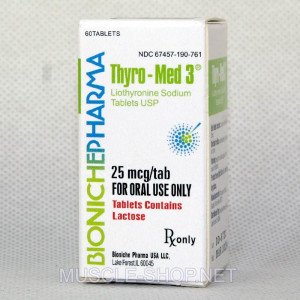Liothyronine Sodium (Cytomel): Everything You Need to Know About the T3 Hormone
What is Liothyronine Sodium-Cytomel (Thyro-Med 3) ?
Cytomel is a synthetic form of the thyroid hormone T3, which is known to accelerate metabolism and promote fat burning. It is also used to treat hypothyroidism, a condition in which the thyroid gland produces insufficient amounts of hormones.
Mechanism of action of Cytomel
Cytomel acts in several ways:
- Improves oxygen absorption and metabolism of proteins, carbohydrates and fats.
- Increases the level of serotonin in the brain, which helps improve mood and reduce stress.
- The effect of taking it is noticeable after a few hours.
Advantages of Cytomel
The main advantages of Cytomel include:
- Acceleration of metabolism and reduction of fat mass.
- Lack of anabolic activity, which prevents the loss of muscle mass.
Side effects
However, like any medication, Cytomel has its own side effects.:
- Muscle catabolism, rapid heartbeat, anxiety, and excessive sweating.
- With prolonged use, thyroid function may be inhibited.
- In rare cases, cardiac hypertrophy or arrhythmia may occur.
Use in bodybuilding
- Cytomel is widely used in bodybuilding to burn fat and improve metabolism. It is often combined with clenbuterol or anabolic steroids to maintain muscle mass.
Accessibility and legality
- Cytomel can be purchased at a pharmacy with a doctor's prescription.
- The medication is not included in the list of prohibited substances allowed for use in professional sports.
Recommendations for use:
- Cytomel should be used with caution and under medical supervision.
- It is important to have regular blood tests to monitor T3 hormone levels.
Cytomel is not a steroid, not a SARM, or something else that athletes use. It is a synthetic thyroid hormone T3. It looks like a real hormone, but it's a little different. It is quickly absorbed and helps burn fat. But it also has disadvantages. Should I use Cytomel? Maybe it's better to choose another way to lose weight?
Bodybuilders and athletes often use lyothyronine sodium to boost metabolism and support the body's fat burning process. This medication is especially popular during preparation for competitions or during periods when it is necessary to get rid of excess weight.
Liothyronine contributes to a noticeable reduction in fat mass, and often even with an increase in the number of calories consumed, which is unusual for such processes. For best results, it is often combined with other weight loss medications such as human growth hormone or beta agonists.
Some athletes believe that thyroid hormones, including lyothyronine sodium, can enhance the anabolic effects of steroids.
Pharmacology
Triiodothyronine, also known as Lyothyronine, is the most active form of thyroid hormone. It has a multifaceted effect on the body, accelerating the basic metabolism, promoting protein synthesis and increasing sensitivity to catecholamines such as adrenaline.
Thyroid hormones play a key role in the development and differentiation of all cells in the human body. They also regulate protein, fat, and carbohydrate metabolism by determining how cells use energy compounds.
Compared to Levothyroxine (T4), Triiodothyronine (Lyothyronine) has a faster onset of action and a shorter biological half-life. This is due to its lower ability to bind to plasma proteins such as thyroxine-binding globulin and transthyretin.
Side effects that may occur when taking Triiodothyronine (Lyothyronine) include:
- Sleep disorders;
- increased blood pressure;
- increased heart rate;
- increased appetite;
- stomach and intestinal problems;
- temperature rise;
- irritability;
- Anxiety.
However, despite these side effects, Triiodothyronine continues to be an important medication for the treatment of thyroid diseases and for maintaining the normal functioning of the body.
Side effects are usually associated with an overdose and can manifest as headaches, irritability, nervousness, excessive sweating, irregular heartbeat, increased intestinal motility or menstrual disorders.
Overdose can also cause shock and worsen the symptoms of angina or congestive heart failure. Chronic overdose of sodium lyothyronine causes symptoms characteristic of hyperthyroidism, a condition in which the body produces too many natural thyroid hormones.
In case of side effects of overdose, you should immediately reduce the dose or completely stop taking sodium lyothyronine. A significant overdose can be life-threatening.
The use of sodium lyothyronine requires careful adherence to the instructions and supervision by medical personnel.
Lyothyronine sodium, known as Thyroxine, is often used in bodybuilding and sports to speed up the fat loss process. It is taken in a dosage of 25 mcg per day. The dose can be gradually increased by 25 mcg every 4-7 days, but not more than 75 mcg per day.
This regimen allows the body to gradually adapt to an increase in thyroid hormone levels, avoiding sudden changes that can cause undesirable side effects. The course of treatment usually lasts no more than 6 weeks.
It is important to remember that stopping the use of sodium lyothyronine should be as gradual as starting it. It is recommended to reduce the dose by 25 mcg every 4-7 days. This will give the body the opportunity to rebuild the production of its own hormones after the end of therapy and help avoid undesirable consequences.
